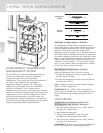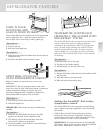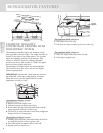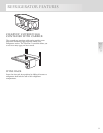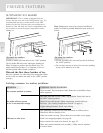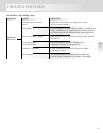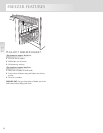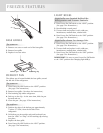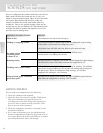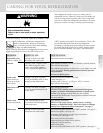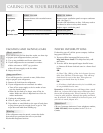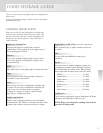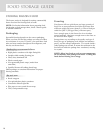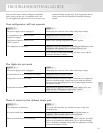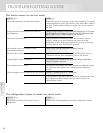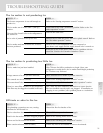
14
Saving energy
You can help your refrigerator use less electricity.
• Clean the condenser coils regularly.
• Open the door as few times as possible. Think about
what you need before you open the door. Get
everything out at one time. Keep food organized so
you won’t have to search for what you want. Close
door as soon as food is removed.
• Fill up the refrigerator, but don’t overcrowd it so air
movement is blocked.
• It is a waste of electricity to set the refrigerator and
freezer to temperatures colder than they need to be. If
ice cream is firm in the freezer and drinks are as cold as
your family likes them, that’s cold enough.
CAUSES
The refrigerator fan motor and moving air.
The thermostat makes a definite click when the refrigerator stops running.
It also makes a sound when the refrigerator starts.
The defrost timer will click when the defrost cycle starts and stops.
You may hear buzzing (from the water valve), trickling water,
and the clatter of ice falling into the bin.
The high-efficiency compressor and motor will run longer than older designs.
The internal fan may occasionally run when the compressor is off.
During the defrost cycle, the refrigerator will not be running. The trickling
water is the frost accumulated on the freezer coil melting and running into
the defrost pan. When the refrigerator stops running, you will hear
gurgling in the tubing for a few minutes.
You may feel air blowing from behind the upper ventilation panel and base
grille when the refrigerator is running. This is normal.
SOUNDS/OBSERVATIONS
Hum or hiss
Clicking or snapping sounds
Ice maker sounds
• trickling water
• clatter of ice
Running sounds
Trickling water/water sounds
Warm air from upper ventilation
panel/base grille
Your new refrigerator may make sounds that your old one
didn’t make. Because the sounds are new to you, you
might be concerned about them. Most of the new sounds
are normal. Hard surfaces like the floor, walls, and
cabinets can make the sounds seem louder than they
actually are. Due to new product designs, there may be
sounds that you are not familiar with. The following chart
describes the kinds of sounds that might be new to you
and what may be making them.
Understanding the
sounds you may hear
SOUNDS IN YOUR
REFRIGERATOR



